牛津译林版英语八年级上Unit 8 Natural disasters Revision课件(31张PPT无素材)
文档属性
| 名称 | 牛津译林版英语八年级上Unit 8 Natural disasters Revision课件(31张PPT无素材) |
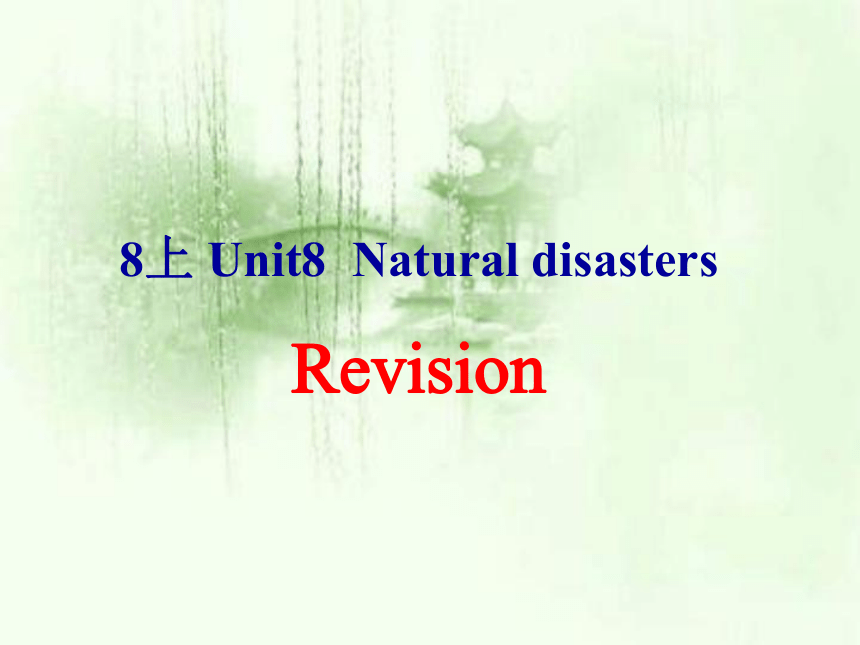
|
|
| 格式 | pptx | ||
| 文件大小 | 248.1KB | ||
| 资源类型 | 教案 | ||
| 版本资源 | 牛津译林版 | ||
| 科目 | 英语 | ||
| 更新时间 | 2020-08-06 00:00:00 | ||
图片预览


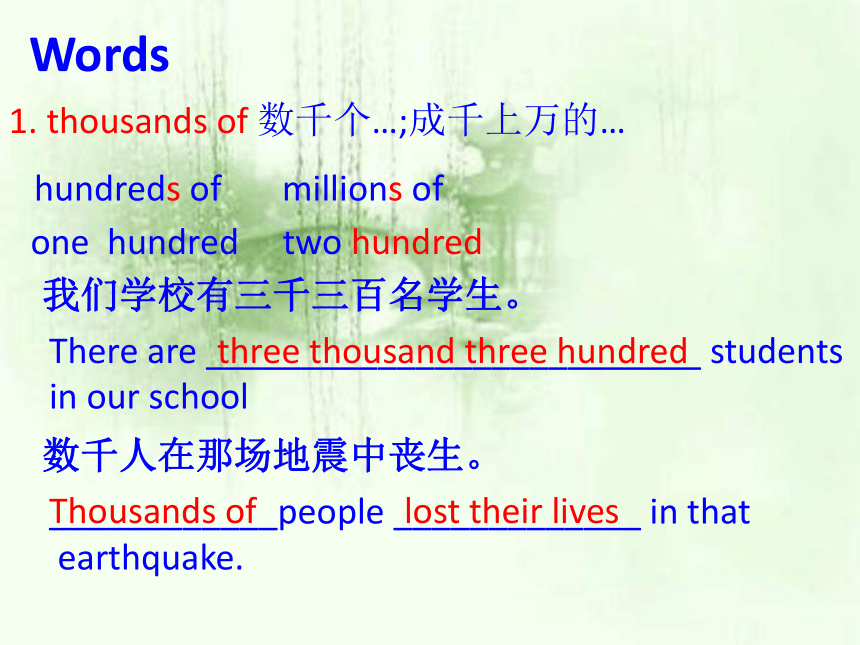
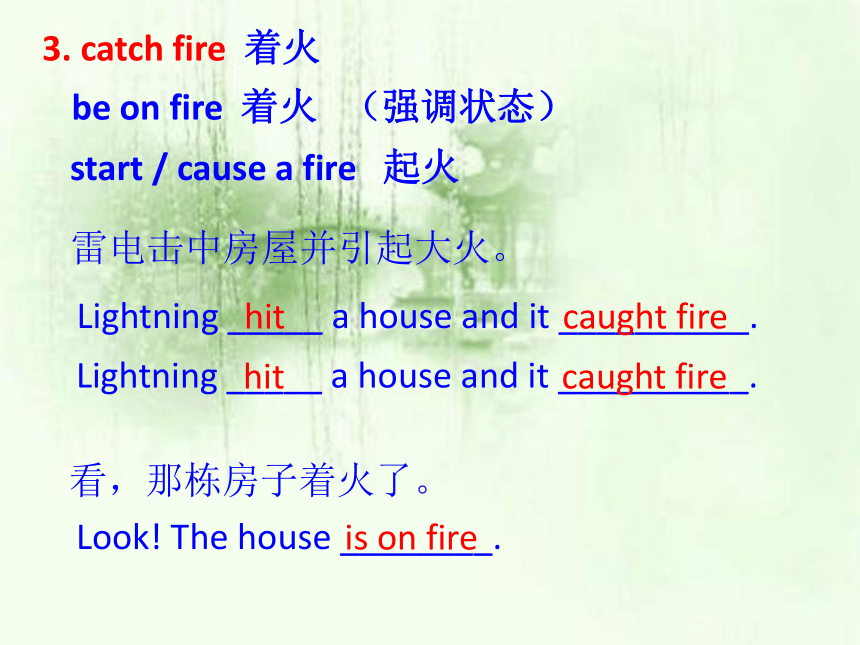
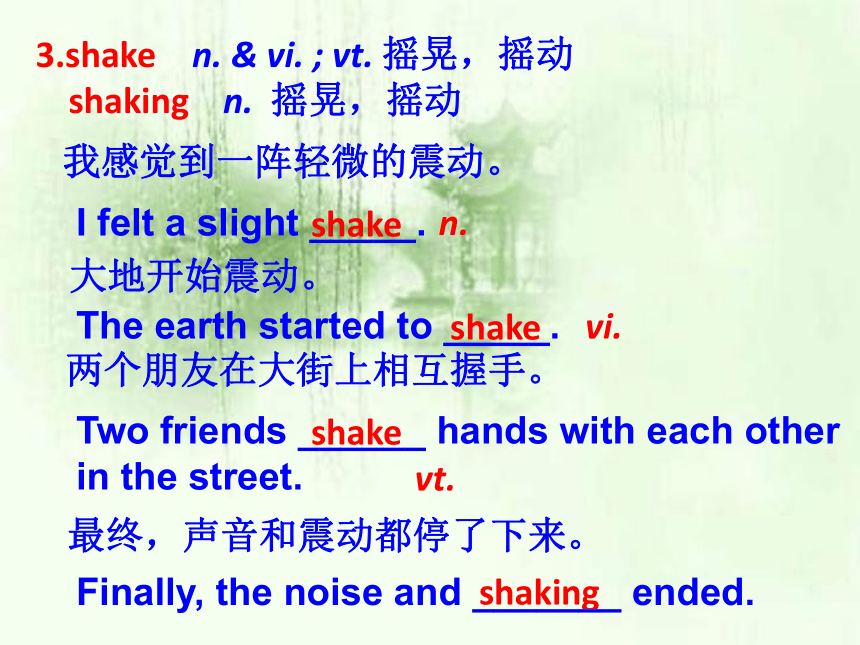
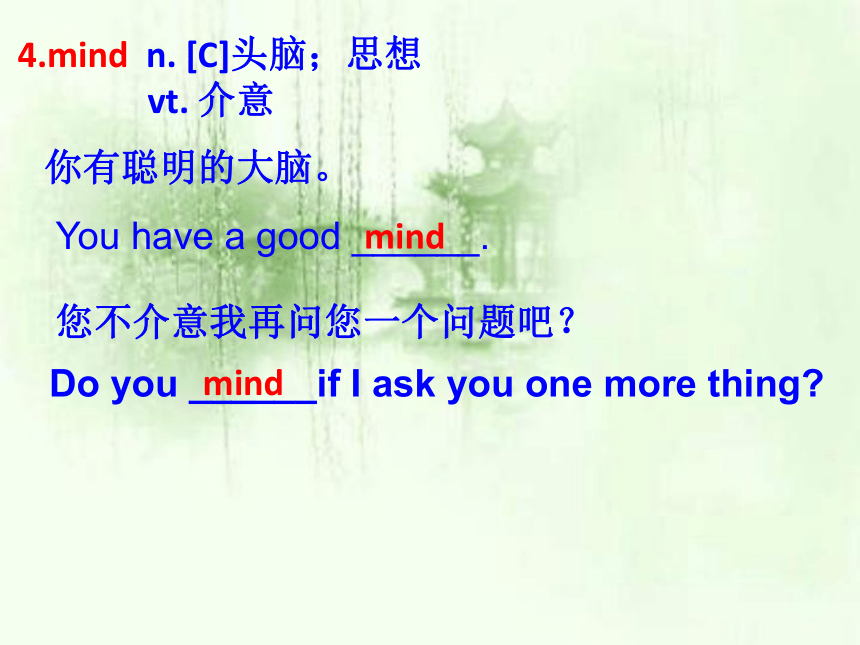
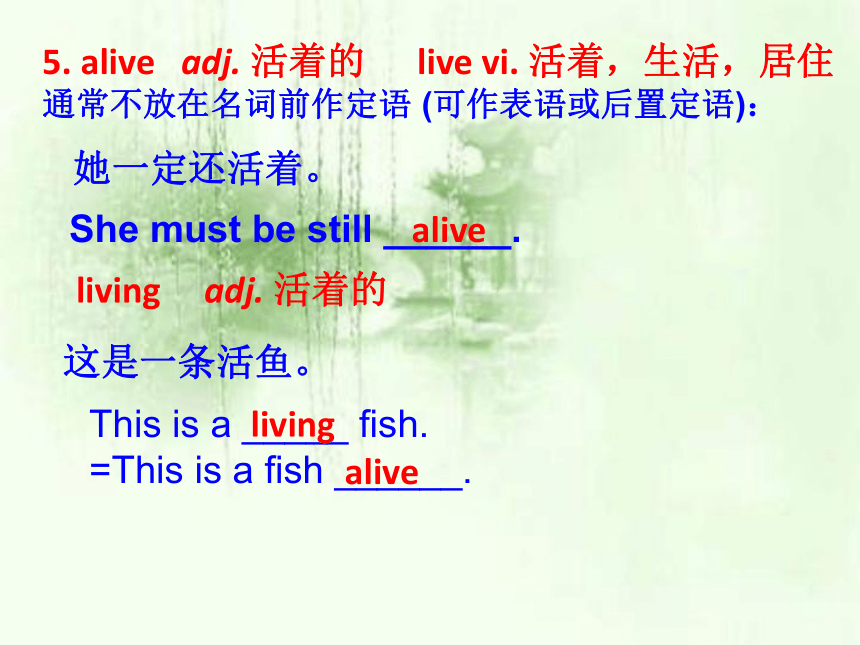
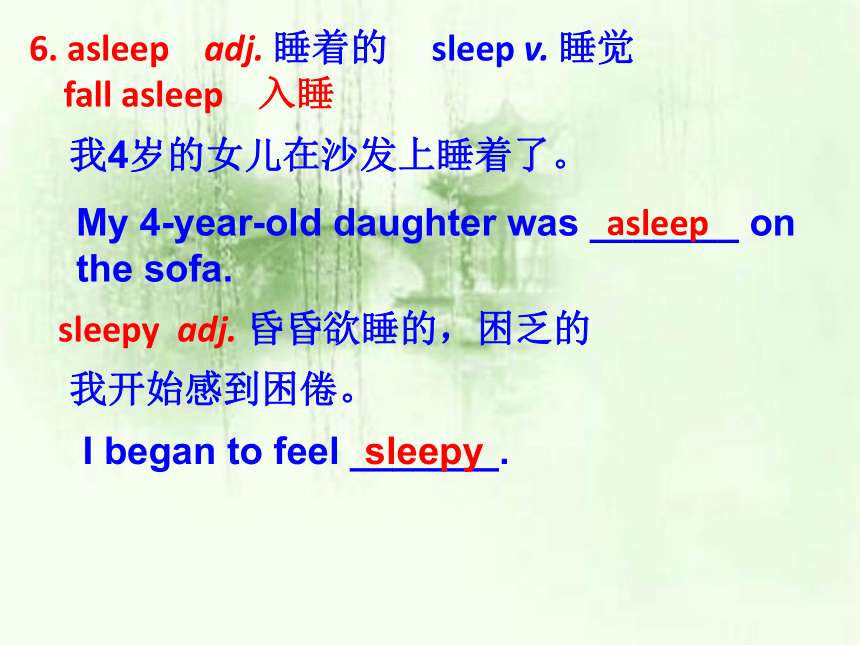
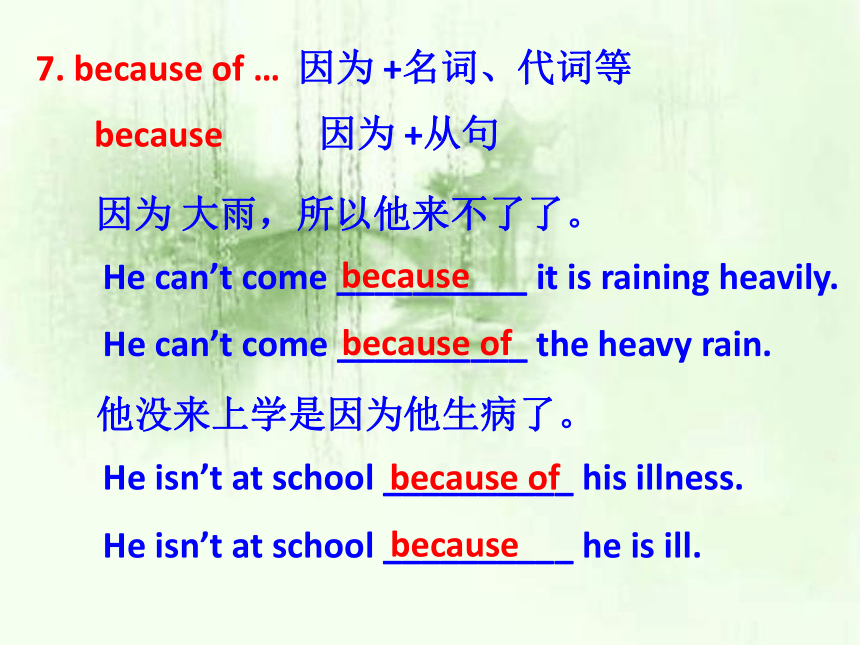
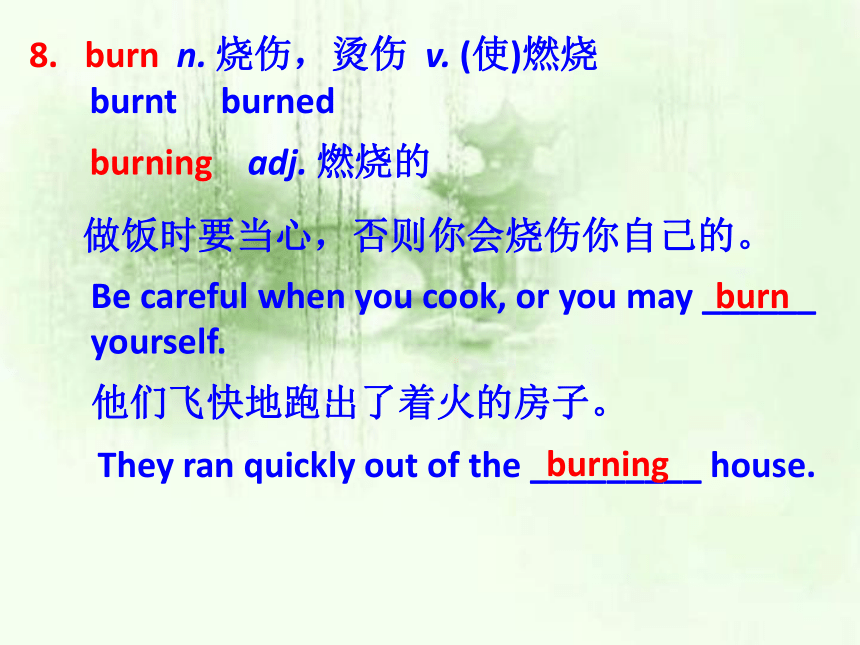
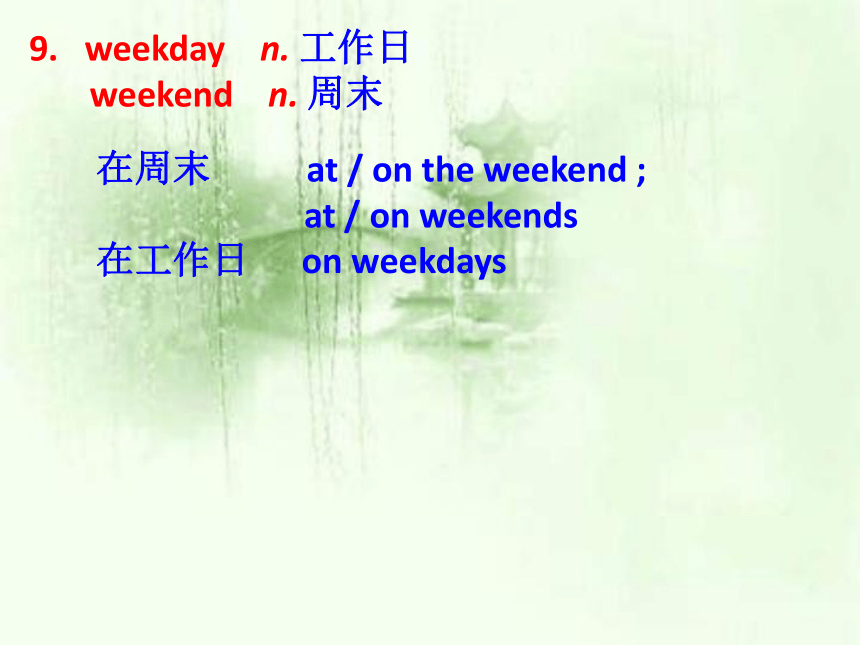
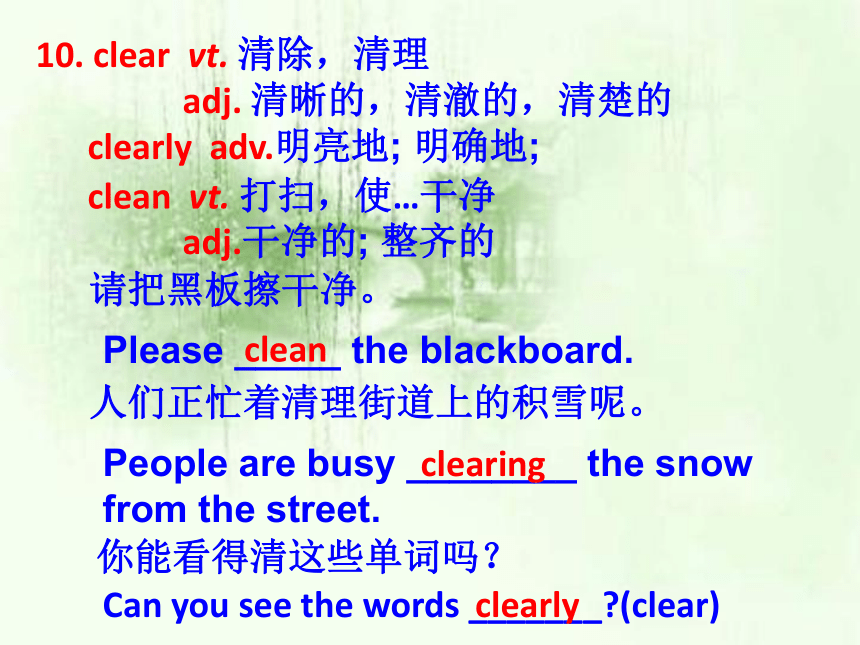
文档简介
8上 Unit8 Natural disasters
Revision
Read the words on the
wordlist on P130-131
1. thousands of 数千个…;成千上万的…
hundreds of millions of
one hundred two hundred
我们学校有三千三百名学生。
There are __________________________ students
in our school
three thousand three hundred
数千人在那场地震中丧生。
____________people _____________ in that
earthquake.
Thousands of lost their lives
Words
3. catch fire 着火
be on fire 着火 (强调状态)
start / cause a fire 起火
雷电击中房屋并引起大火。
Lightning _____ a house and it __________.
hit caught fire
看,那栋房子着火了。
Look! The house ________.
is on fire
Lightning _____ a house and it __________.
hit caught fire
3.shake
n. & vi. ; vt. 摇晃,摇动
shaking
n. 摇晃,摇动
我感觉到一阵轻微的震动。
I felt a slight _____.
shake
shaking
Finally, the noise and _______ ended.
最终,声音和震动都停了下来。
n.
大地开始震动。
The earth started to _____.
shake
vi.
两个朋友在大街上相互握手。
Two friends ______ hands with each other
in the street.
shake
vt.
4.mind n. [C]头脑;思想
vt. 介意
你有聪明的大脑。
You have a good ______.
mind
Do you ______if I ask you one more thing?
您不介意我再问您一个问题吧?
mind
5. alive adj. 活着的 live vi. 活着,生活,居住
通常不放在名词前作定语 (可作表语或后置定语):
She must be still ______.
她一定还活着。
alive
living adj. 活着的
This?is?a?_____?fish.
=This?is?a?fish?______.?
这是一条活鱼。
living
alive
6. asleep adj. 睡着的 sleep v. 睡觉
sleepy adj. 昏昏欲睡的,困乏的
fall asleep 入睡
My 4-year-old daughter was _______ on
the sofa.
我4岁的女儿在沙发上睡着了。
asleep
I began to feel _______.
我开始感到困倦。
sleepy
7. because of … 因为 +名词、代词等
because 因为 +从句
因为 大雨,所以他来不了了。
He can’t come __________ it is raining heavily.
He can’t come __________ the heavy rain.
他没来上学是因为他生病了。
He isn’t at school __________ his illness.
He isn’t at school __________ he is ill.
because
because of
because of
because
8. burn n. 烧伤,烫伤 v. (使)燃烧
burnt burned
burning adj. 燃烧的
做饭时要当心,否则你会烧伤你自己的。
Be careful when you cook, or you may ______
yourself.
burn
他们飞快地跑出了着火的房子。
They ran quickly out of the _________ house.
burning
9. weekday n. 工作日
weekend n. 周末
在周末 at / on the weekend ;
at / on weekends
在工作日 on weekdays
10. clear vt. 清除,清理
adj. 清晰的,清澈的,清楚的
clearly adv.明亮地;?明确地;
clean vt. 打扫,使…干净
adj.干净的;?整齐的
请把黑板擦干净。
Please _____ the blackboard.
clean
人们正忙着清理街道上的积雪呢。
People are busy ________ the snow
from the street.
clearing
Can you see the words _______?(clear)
clearly
你能看得清这些单词吗?
Phrases
1.把…拖干净(代词放中间)mop…up
把它/它们拖干净 mop it /them up
把水拖干 mop the water up= mop up the water
2.将…冲走(代词放中间)wash…away
将它/它们冲走 wash it /them away
冲走村庄 wash away the village
=wash the village away
3. 输掉比赛 lose the game
输掉决赛 lose the final
4.一场事故 an accident
一起车祸 a car accident
一起交通事故 a traffic accident
5. 从树上跌落 fall off the tree
fall from the tree
摔倒 fall over
6.伴有雷声和闪电的一场大风暴
a heavy storm with thunder and lightning
7. 在凌晨 in the early morning
在傍晚 in the late afternoon
8. 恐惧地尖叫 scream in fear
害怕地互相看着
look at each other in fear
惊恐地(处于恐惧之中) in fear
9. 朝四面八方跑去
run in all directions
=run in every direction
10.保持…安全免受…. keep … safe from …
保持自己免受火灾
keep ourselves safe from fires
保护…不受…之害 protect …from…
保护你自己免受烟的伤害
protect yourself from smoke
Sentences
1. 开始下雨时我正在睡觉。
I ____________when it started to rain.
was sleeping
Lightning _____ a classroom building and it
___________.
2. 闪电击中教学楼并着火了。
hit
caught fire
3. 用一个湿毛巾捂住嘴巴和鼻子以防浓烟。
_______your mouth and nose with a wet towel to _________yourself ______ thick smoke.
4. 不要回到(进入)着火的大楼。
Never _____________the building_______.
Cover
protect
from
go back into
on fire
5. 当我们烧伤自己时,你知道我们先做什么?
Do you know what _______first when we burn ourselves?
to do
基本用法 过去进行时
1.表示在过去某个时间点正在发生的动作.常与
at ten last night, at this time yesterday,
at that time/moment,when I came in等连用.
2.表示在过去某段时间之内持续不断发生的动作.常与last night, this morning, from…to
(from7 to 10 this morning)连用.
He wrote a letter yesterday morning.
He was writing a letter yesterday morning.
区别: 昨天上午他写了一封信.
昨天上午他一直写信.
(1)肯定句: was/were + v-ing
(2)否定式: was/were not + v-ing
was not = wasn’t
were not = weren’t
(3)疑问句:将 was/were 调到主语前
过去进行时的句式
Past continuous tense
with ‘while’ , ‘when’ and ‘as’
when, while 和 as 这三个词都有“当……时候”的意思。
2.when 和 as 既可以指某一点时间,也可以指某一段时间,其从句谓语动词表示的动作既可以是瞬间性的,也可以是延续性的;while指一段时间,从句中的谓语动词必须是延续性的。即:指一段时间时when, while 和as都可用;指一点时间时,只能用when,不能用while。
3. 当 while , when 和 as 放在句首时,两个
句子应用逗号隔开。
1.两个延续性动作同时在过去发生时,用过去进行时,用while连接。
I was doing my homework _______
my mother was cooking last night.
(when, while)
while
延续性动词,即可以持续很长时间的动词,如:enjoy, watch, read, play, stay, run等.
2.延续性动词用过去进行时,
短暂性动词用一般过去时.
when +短暂性动词
while+延续性动词
The earthquake started
while I was doing some shopping.
I was trying to find my way out
when I suddenly heard some noise above me.
巩固练习(用when/ while填空)
My wallet dropped on the ground _________
I was running.
2. __________ I just went to bed, there was
a loud knock on the door.
3. __________ he was reading, an
earthquake started.
4. Were the students listening to the teacher carefully __________ the teacher was giving
a lesson?
5. __________ the telephone rang, I became nervous.
while
When
While
while
When
--- What were you doing this time yesterday?
--- I ____ on the grass and drawing a picture.
A. sit B. sat
C. am sitting D. was sitting
2. When I came back yesterday evening, my brother _____ his homework.
A. is doing B. has done
C. was doing
I. Multiple choice.
3. --- I called you at 4:00 yesterday afternoon, but no one answered.
--- Sorry, I _____ with my friends at that time.
A. swim B. swam
C. will swim D. was swimming
4. --- Amy, I called you yesterday evening, but nobody answered the phone.
--- Oh, I __ a walk with my mother at that time.
A. take B. took
C. am taking D. was taking
5. He _____ when the UFO arrived. He didn’t wake until the UFO disappeared.
A. slept B. was sleeping
C. was doing homework D. was singing
II. Fill in the blanks.
People ___________ (run) wildly while pieces of bricks ____________ (fall) down.
We should prevent hunters form ___________ (catch) wild animals.
Our maths teacher warned us __________ (not copy) other’s answers.
The temperature _______ (drop) a lot today.
were running
were falling
catching
not to copy
drops
Revision
Read the words on the
wordlist on P130-131
1. thousands of 数千个…;成千上万的…
hundreds of millions of
one hundred two hundred
我们学校有三千三百名学生。
There are __________________________ students
in our school
three thousand three hundred
数千人在那场地震中丧生。
____________people _____________ in that
earthquake.
Thousands of lost their lives
Words
3. catch fire 着火
be on fire 着火 (强调状态)
start / cause a fire 起火
雷电击中房屋并引起大火。
Lightning _____ a house and it __________.
hit caught fire
看,那栋房子着火了。
Look! The house ________.
is on fire
Lightning _____ a house and it __________.
hit caught fire
3.shake
n. & vi. ; vt. 摇晃,摇动
shaking
n. 摇晃,摇动
我感觉到一阵轻微的震动。
I felt a slight _____.
shake
shaking
Finally, the noise and _______ ended.
最终,声音和震动都停了下来。
n.
大地开始震动。
The earth started to _____.
shake
vi.
两个朋友在大街上相互握手。
Two friends ______ hands with each other
in the street.
shake
vt.
4.mind n. [C]头脑;思想
vt. 介意
你有聪明的大脑。
You have a good ______.
mind
Do you ______if I ask you one more thing?
您不介意我再问您一个问题吧?
mind
5. alive adj. 活着的 live vi. 活着,生活,居住
通常不放在名词前作定语 (可作表语或后置定语):
She must be still ______.
她一定还活着。
alive
living adj. 活着的
This?is?a?_____?fish.
=This?is?a?fish?______.?
这是一条活鱼。
living
alive
6. asleep adj. 睡着的 sleep v. 睡觉
sleepy adj. 昏昏欲睡的,困乏的
fall asleep 入睡
My 4-year-old daughter was _______ on
the sofa.
我4岁的女儿在沙发上睡着了。
asleep
I began to feel _______.
我开始感到困倦。
sleepy
7. because of … 因为 +名词、代词等
because 因为 +从句
因为 大雨,所以他来不了了。
He can’t come __________ it is raining heavily.
He can’t come __________ the heavy rain.
他没来上学是因为他生病了。
He isn’t at school __________ his illness.
He isn’t at school __________ he is ill.
because
because of
because of
because
8. burn n. 烧伤,烫伤 v. (使)燃烧
burnt burned
burning adj. 燃烧的
做饭时要当心,否则你会烧伤你自己的。
Be careful when you cook, or you may ______
yourself.
burn
他们飞快地跑出了着火的房子。
They ran quickly out of the _________ house.
burning
9. weekday n. 工作日
weekend n. 周末
在周末 at / on the weekend ;
at / on weekends
在工作日 on weekdays
10. clear vt. 清除,清理
adj. 清晰的,清澈的,清楚的
clearly adv.明亮地;?明确地;
clean vt. 打扫,使…干净
adj.干净的;?整齐的
请把黑板擦干净。
Please _____ the blackboard.
clean
人们正忙着清理街道上的积雪呢。
People are busy ________ the snow
from the street.
clearing
Can you see the words _______?(clear)
clearly
你能看得清这些单词吗?
Phrases
1.把…拖干净(代词放中间)mop…up
把它/它们拖干净 mop it /them up
把水拖干 mop the water up= mop up the water
2.将…冲走(代词放中间)wash…away
将它/它们冲走 wash it /them away
冲走村庄 wash away the village
=wash the village away
3. 输掉比赛 lose the game
输掉决赛 lose the final
4.一场事故 an accident
一起车祸 a car accident
一起交通事故 a traffic accident
5. 从树上跌落 fall off the tree
fall from the tree
摔倒 fall over
6.伴有雷声和闪电的一场大风暴
a heavy storm with thunder and lightning
7. 在凌晨 in the early morning
在傍晚 in the late afternoon
8. 恐惧地尖叫 scream in fear
害怕地互相看着
look at each other in fear
惊恐地(处于恐惧之中) in fear
9. 朝四面八方跑去
run in all directions
=run in every direction
10.保持…安全免受…. keep … safe from …
保持自己免受火灾
keep ourselves safe from fires
保护…不受…之害 protect …from…
保护你自己免受烟的伤害
protect yourself from smoke
Sentences
1. 开始下雨时我正在睡觉。
I ____________when it started to rain.
was sleeping
Lightning _____ a classroom building and it
___________.
2. 闪电击中教学楼并着火了。
hit
caught fire
3. 用一个湿毛巾捂住嘴巴和鼻子以防浓烟。
_______your mouth and nose with a wet towel to _________yourself ______ thick smoke.
4. 不要回到(进入)着火的大楼。
Never _____________the building_______.
Cover
protect
from
go back into
on fire
5. 当我们烧伤自己时,你知道我们先做什么?
Do you know what _______first when we burn ourselves?
to do
基本用法 过去进行时
1.表示在过去某个时间点正在发生的动作.常与
at ten last night, at this time yesterday,
at that time/moment,when I came in等连用.
2.表示在过去某段时间之内持续不断发生的动作.常与last night, this morning, from…to
(from7 to 10 this morning)连用.
He wrote a letter yesterday morning.
He was writing a letter yesterday morning.
区别: 昨天上午他写了一封信.
昨天上午他一直写信.
(1)肯定句: was/were + v-ing
(2)否定式: was/were not + v-ing
was not = wasn’t
were not = weren’t
(3)疑问句:将 was/were 调到主语前
过去进行时的句式
Past continuous tense
with ‘while’ , ‘when’ and ‘as’
when, while 和 as 这三个词都有“当……时候”的意思。
2.when 和 as 既可以指某一点时间,也可以指某一段时间,其从句谓语动词表示的动作既可以是瞬间性的,也可以是延续性的;while指一段时间,从句中的谓语动词必须是延续性的。即:指一段时间时when, while 和as都可用;指一点时间时,只能用when,不能用while。
3. 当 while , when 和 as 放在句首时,两个
句子应用逗号隔开。
1.两个延续性动作同时在过去发生时,用过去进行时,用while连接。
I was doing my homework _______
my mother was cooking last night.
(when, while)
while
延续性动词,即可以持续很长时间的动词,如:enjoy, watch, read, play, stay, run等.
2.延续性动词用过去进行时,
短暂性动词用一般过去时.
when +短暂性动词
while+延续性动词
The earthquake started
while I was doing some shopping.
I was trying to find my way out
when I suddenly heard some noise above me.
巩固练习(用when/ while填空)
My wallet dropped on the ground _________
I was running.
2. __________ I just went to bed, there was
a loud knock on the door.
3. __________ he was reading, an
earthquake started.
4. Were the students listening to the teacher carefully __________ the teacher was giving
a lesson?
5. __________ the telephone rang, I became nervous.
while
When
While
while
When
--- What were you doing this time yesterday?
--- I ____ on the grass and drawing a picture.
A. sit B. sat
C. am sitting D. was sitting
2. When I came back yesterday evening, my brother _____ his homework.
A. is doing B. has done
C. was doing
I. Multiple choice.
3. --- I called you at 4:00 yesterday afternoon, but no one answered.
--- Sorry, I _____ with my friends at that time.
A. swim B. swam
C. will swim D. was swimming
4. --- Amy, I called you yesterday evening, but nobody answered the phone.
--- Oh, I __ a walk with my mother at that time.
A. take B. took
C. am taking D. was taking
5. He _____ when the UFO arrived. He didn’t wake until the UFO disappeared.
A. slept B. was sleeping
C. was doing homework D. was singing
II. Fill in the blanks.
People ___________ (run) wildly while pieces of bricks ____________ (fall) down.
We should prevent hunters form ___________ (catch) wild animals.
Our maths teacher warned us __________ (not copy) other’s answers.
The temperature _______ (drop) a lot today.
were running
were falling
catching
not to copy
drops
